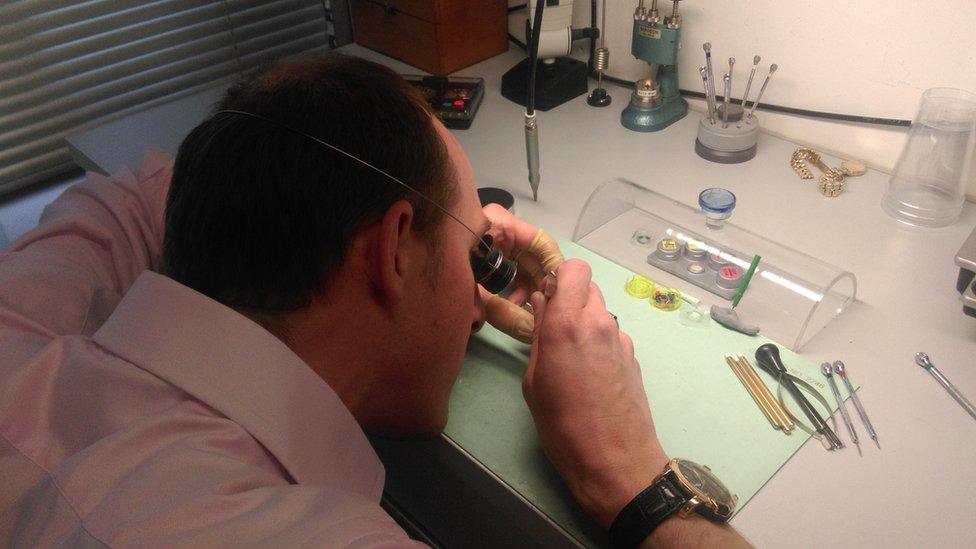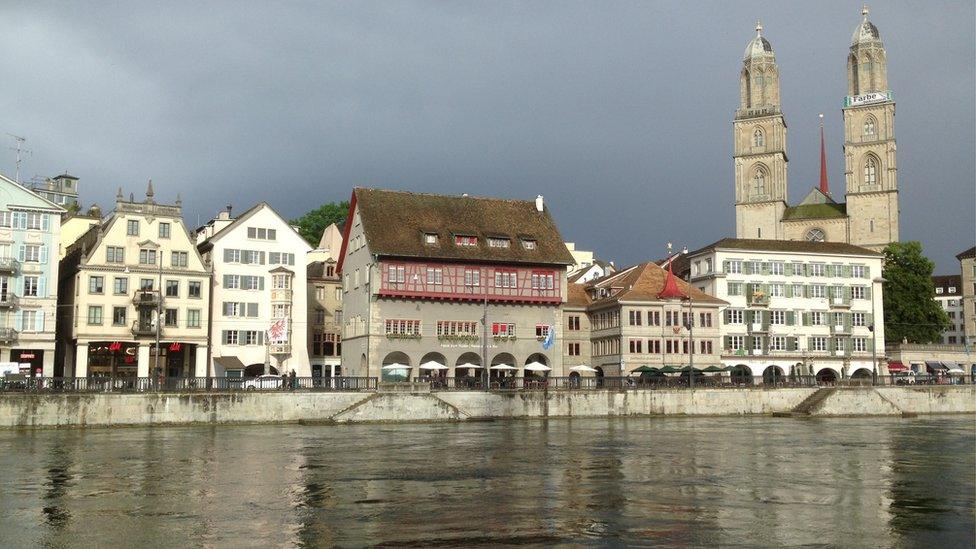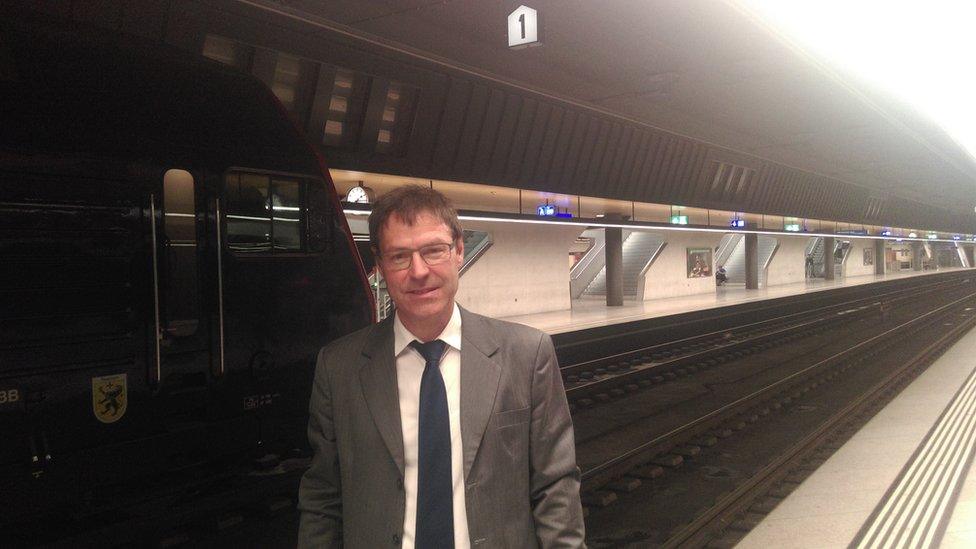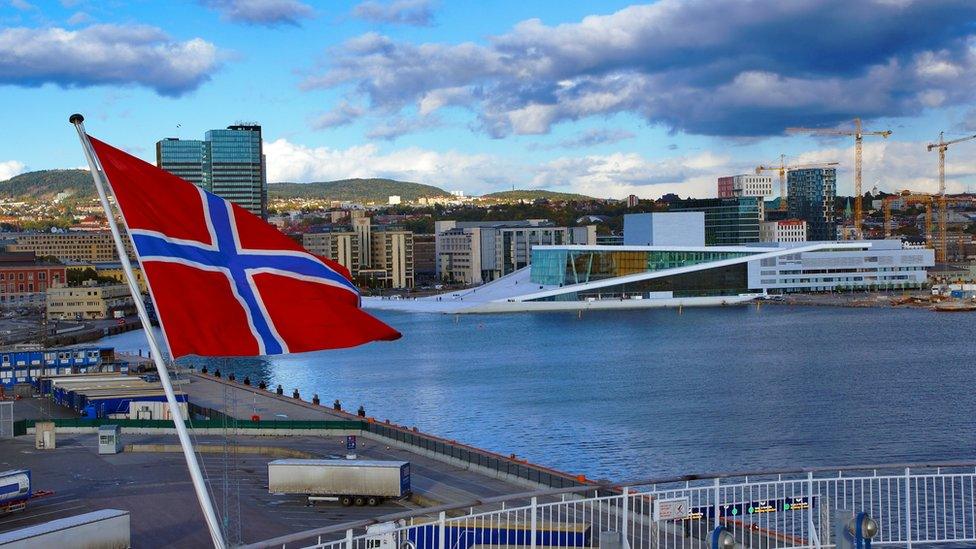Will the Swiss introduce limits to immigration from the EU?
- Published

Watchmaker Marc Jenni peers through an eyeglass, carefully placing a tiny, new component into a shiny gold timepiece he is fixing.
He is a Swiss national, the third generation of his family to go into the horology trade. He would like his children to make Swiss watches too. "But I won't force them to," he says.
The Jenni family's small, independent shop in the centre of the pretty, medieval city of Zurich displays a range of ornate clocks that are hundreds of years old. One is made of wood, and is from the 1600s.
While such incredibly old pieces of work exist, Marc says the manufacture of one of the symbols of Switzerland is changing.
"If we look at the watch business, we can see about 80% of the workforce are foreigners from France, from Italy, from Germany."
Immigration is a hot topic in Switzerland. About one in four people here are foreigners. That's one of the highest proportions of foreign residents in the world.
"Immigration has always been an issue here," Marc says, but he welcomes the non-Swiss workers to his industry.
"It helps the Swiss industry. They earn a bit less, but get more money than most of their citizens at home. Everyone profits."

Not everyone in this nation of 8 million people is as welcoming as Mr Jenni.
The Swiss government is waiting to have discussions with the European Union about limiting the flow of EU workers into Switzerland.
Quotas
The Alpine nation is currently part of Europe's Schengen borderless area, so people can come and go as they please.
That is supposed to be changing after a majority - albeit a slim one - of people voted in a 2014 referendum to introduce quotas on the number of people from the EU who could enter Switzerland.
Negotiations are due to take place after the UK decides whether to stay in or leave the EU.
The EU does not seem inclined to negotiate over its much-cherished principle of free movement. So there is a stand-off.
About 20 minutes by train along the edge of Lake Zurich is the picture postcard perfect town of Maennedorf.
Its traditional, tall, pastel-coloured homes are nestled among trees on the hillside. It is a clean, tidy, quiet, fairly sleepy place.
'We must do it alone'
It is also a stronghold of the anti-immigration Swiss People's Party (SVP), the strongest political party in Switzerland, and part of the coalition government.
Christoph Blocher, the millionaire industrialist and controversial former leader of the SVP, runs his company from Maennedorf.
"We are a small country. Immigration is more and more. The population in Switzerland will have a problem with space, and for the schools and the hospitals."
"If we don't find an agreement with the EU we must do it alone, " he says.
Talk of a unilateral decision to effectively close Switzerland's borders to some EU citizens is causing nervousness among businesses.
Deep under the centre of Zurich, long, double-decker trains thunder away from underground platforms, taking commuters home after a day's work.
The station and the tunnel that snakes its way underneath Zurich have only been open a couple of years.
Standing on the platform is David Grossman, a director of one of the engineering companies that helped build it.
He says none of it would have been possible without workers from abroad.
Foreign workers are, he insists, "crucial to the success of Switzerland."
"In terms of engineering we have a lot of specialities where we can't find the people in Switzerland. If we want to stay competitive, we need the best."

Foreign workers are crucial to Switzerland's economy, says David Grossman
It's not just staff shortages that could become a problem. Some fear Switzerland could lose access to the European single market of 500 million potential customers.
Game of chicken
Daniel Kalt, the chief Swiss economist at the banking giant UBS, says "The risk is if we can't find a solution with the EU about how to amend the treaty on the free movement of labour, we might get into a situation where the EU cancels the whole package of treaties."
Those 100 or so treaties dictate Switzerland's relationship with the EU, the biggest buyer of its exports.
While sipping an espresso at a pleasant pavement café in Zurich's successful financial district, Mr Kalt says the economic cost of failing to do an immigration deal could be huge.
"We would probably lose access to quite important sectors and industries in terms of getting access to European markets. That's a huge political risk now."
It's a game of chicken that many businesses do not want to play.
But Christoph Blocher of the Swiss People's Party says the EU is bluffing and would not cut trade ties with Switzerland.
"It's always the same thing they say," he says, dismissing such talk as an empty threat.
Tricky negotiation
Companies say a negotiated outcome could also be painful, if a deal to limit inward migration can only be done in exchange for giving up some access to the single market.
"Ultimately in a worse case, this could happen," says Dr Jan Atteslander from the business organisation Economie Suisse.
"Both sides are not so silly to let it happen. They do everything to prevent this, but in theory it could happen."
Despite the fears companies have for their market access and for the future of the Swiss economy, business leaders recognise there are genuine concerns about immigration levels.
"We have net migration of more than 80,000 people a year. We can only build a maximum 40,000 houses and apartments," says Dr Jan Atteslander.
"That's one of the reasons the population said we have to slow it down."
Finding a solution that satisfies businesses, the Swiss people and the EU may well be tricky.
- Published15 June 2016
